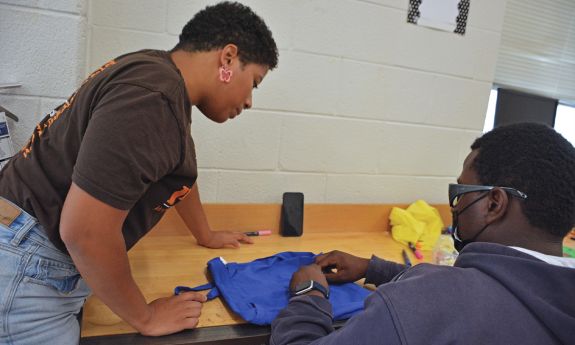Transforming Research on Racial Equity into Action
A grant funds Duke faculty’s creative projects exploring how race shapes life


Led by Electrical & Computer Engineering and Computer Science Professor of the Practice Shaundra Daily, the project partners with local youth enrichment program Inspiring Minds to let Duke undergraduates test innovative ways to nurture curiosity about science and technology in middle and high school students from underrepresented minorities.
“It’s really rewarding,” said Belgrave, who is Black and Latina. “I see myself in these students. I love that they get to express their personality, their culture and things they like within their tech.”
As part of Duke’s effort to address racial equity, “Inspiring the Next Generation of STEM Learners” is funded through a Duke grant program that dates to the university’s anti-racism commitment amid 2020’s nationwide awakening about systemic racism. The Duke Endowment provided Duke University with $16 million for recruiting and retaining diverse faculty, creating courses and student research opportunities about race and inequality, and funding new faculty-led research projects exploring how racial and social inequality shapes life in Durham and North Carolina.
“We need to leverage the resources and expertise we have, not just on the basic research side, but also the applied side, where we try to use innovative research for the benefit of the community,” said Vice Provost for Faculty dvancement Abbas Benmamoun.
In 2021, the first round of grants went to 17 projects studying race, racism and the American South. Projects included collecting oral histories of environmental racism, sharing the stories of Durham’s Black burial grounds, and more. Last year, 18 projects were funded looking into how racial inequality manifests in areas such as North Carolina’s foster care system, jury pools, housing market and health care.
This year’s grants funded community-engaged research projects addressing educational inequality. “Inspiring the Next Generation of STEM Learners” was one of seven projects chosen by representatives from Duke Faculty Advancement, the Duke Office of Durham and Community Affairs, Duke Interdisciplinary Studies and the Durham community. “The ideas our students will come up with will have a tie to the community and a social impact component,” said Duke Research Scientist Alia Carter, who is helping oversee the project with Duke Associate in Research Sandra Roach. “I want them to think of STEM as a superpower, and we’re using it to benefit the community.”
Send us ideas for our Working Toward Racial Justice series through our story idea form or write working@duke.edu.
Follow Working@Duke on X (Twitter), Facebook, and Instagram.